|
|
|
Sort Order |
|
|
|
Items / Page
|
|
|
|
|
|
|
| Srl | Item |
| 1 |
ID:
111218
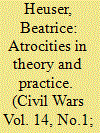

|
|
|
|
|
| Publication |
2012.
|
| Summary/Abstract |
Classical counterinsurgency theory - written before the 19th century - has generally strongly opposed atrocities, as have theoreticians writing on how to conduct insurgencies. For a variety of reasons - ranging from pragmatic to religious or humanitarian - theoreticians of both groups have urged the lenient treatment of civilians associated with the enemy camp, although there is a marked pattern of exceptions, for example, where heretics or populations of cities refusing to surrender to besieging armies are concerned. And yet atrocities - defined here as acts of violence against the unarmed (non-combatants, or wounded or imprisoned enemy soldiers), or needlessly painful and/or humiliating treatment of enemy combatants, beyond any action needed to incapacitate or disarm them - occur frequently in small wars. Examples abound where these exhortations have been ignored, both by forces engaged in an insurgency and by forces trying to put down a rebellion. Why have so many atrocities been committed in war if so many arguments have been put forward against them? This is the basic puzzle for which the individual contributions to this special issue are seeking to find tentative answers, drawing on case studies.
|
|
|
|
|
|
|
|
|
|
|
|
|
|
|
|
| 2 |
ID:
051801


|
|
|
|
|
| Publication |
London, Longman, 2000.
|
| Description |
xii, 236p.
|
| Series |
Turning points
|
| Standard Number |
0582292913
|
|
|
|
|
|
|
|
|
|
|
|
Copies: C:1/I:0,R:0,Q:0
Circulation
| Accession# | Call# | Current Location | Status | Policy | Location |
| 044723 | 355.825119/HEU 044723 | Main | On Shelf | General | |
|
|
|
|
| 3 |
ID:
154955
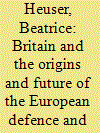

|
|
|
|
|
| Summary/Abstract |
Throughout the second half of the twentieth century, the UK played a key role in the creation and development of a flexible and sustainable mechanism for European defence and security. Beatrice Heuser reviews the history of this engagement, and argues that changes in the UK’s institutional relationship with European partners should not be allowed to undermine the overarching principles of defence cooperation.
|
|
|
|
|
|
|
|
|
|
|
|
|
|
|
|
| 4 |
ID:
124744
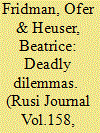

|
|
|
|
|
| Publication |
2013.
|
| Summary/Abstract |
Since the second world war, counter insurgency and counter terrorism operations have become much more frequent and widespread than large scale conventional confrontation. While at first three was a widespread perception that relatively small badly trained and poorly equipped groups.
|
|
|
|
|
|
|
|
|
|
|
|
|
|
|
|
| 5 |
ID:
155065


|
|
|
|
|
| Summary/Abstract |
This analysis examines NATO’s tactical/non-strategic nuclear weapons in the Cold War both for their perceived deterrent value against the Soviet Union and Warsaw Pact and as potential war fighting weapons. Within this debate lay questions related to extended deterrence, security guarantees, regional or theatre conflict, and escalatory potential. A central tenet that emerged in Europe was that nuclear weapons needed emplacement on the territory of non-nuclear NATO members to make deterrence more tangible. It raised huge questions of consultation. Once the Soviet Union had intercontinental missiles, the credibility of American readiness to use nuclear weapons in defence of its allies came into question. European alternatives and different consultation mechanisms to facilitate nuclear use became central to intra-NATO relations. Actively debated across NATO, they directly concerned above all the United States, Britain, and France—the nuclear weapons states in the NATO area—and West Germany, the potential main battleground in a Warsaw Pact invasion. Although dormant in NATO since the end of the Cold War, these issues will likely see revisiting in both Europe and other regional trouble spots.
|
|
|
|
|
|
|
|
|
|
|
|
|
|
|
|
| 6 |
ID:
133510
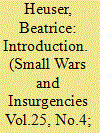

|
|
|
|
|
| Publication |
2014.
|
| Summary/Abstract |
When twentieth-century authors wrote about 'partisan warfare', they usually meant an insurgency or asymmetric military operations conducted against a superior force by small bands of ideologically driven irregular fighters. By contrast, originally (i.e. before the French Revolution) 'partisan' in French, English, and German referred only to the leader of a detachment of special forces (party, partie, Parthey, détachement) which the major European powers used to conduct special operations alongside their regular forces. Such special operations were the classic definition of 'small war' (petite guerre) in the late seventeenth and in the eighteenth centuries. The Spanish word 'la guerrilla', meaning nothing other than 'small war', only acquired an association with rebellion with the Spanish War of Independence against Napoleon. Even after this, however, armies throughout the world have continued to employ special forces. In the late nineteenth century, their operations have still been referred to as prosecuting 'la guerrilla' or 'small war', which existed side by side with, and was often mixed with, 'people's war' or popular uprisings against hated regimes.
|
|
|
|
|
|
|
|
|
|
|
|
|
|
|
|
| 7 |
ID:
133518
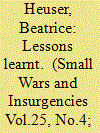

|
|
|
|
|
| Publication |
2014.
|
| Summary/Abstract |
Did participants in small wars in the period 1775-1831 learn from previous or contemporary examples? While this is difficult to prove for participants who left no written records, there is considerable evidence in existing publications by practitioners that they did indeed draw out lessons from recent insurgencies, either from their own experience or from events elsewhere which they studied from afar, especially the Spanish Guerrilla, which had already become legendary. Most authors showed an interest in how to stage insurgencies rather than in how to quell them. Even then, transfer did not come in a package of tactics-cum-values, but in each case in different configurations.
|
|
|
|
|
|
|
|
|
|
|
|
|
|
|
|
| 8 |
ID:
154486
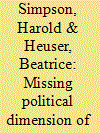

|
|
|
|
|
| Summary/Abstract |
Military exercises are rarely straightforward in either intention or outcome. Official policy and governance about exercises have not kept up with the complexity of the current national and international contexts. In addition to collective training, exercises are now used for a wide variety of purposes, such as fostering alliance cohesion and defence diplomacy. In this article, Beatrice Heuser and Harold Simpson argue that the diverse effects and outcomes of exercises merit further investigation, and future guidance for British practitioners will reflect this.
|
|
|
|
|
|
|
|
|
|
|
|
|
|
|
|
| 9 |
ID:
048823


|
|
|
|
|
| Publication |
Hampshire, macmillan Press, 1997.
|
| Description |
xvii, 256p.
|
| Standard Number |
0333673654
|
|
|
|
|
|
|
|
|
|
|
|
Copies: C:1/I:0,R:0,Q:0
Circulation
| Accession# | Call# | Current Location | Status | Policy | Location |
| 039495 | 355.825119094/HEU 039495 | Main | On Shelf | General | |
|
|
|
|
| 10 |
ID:
048563


|
|
|
|
|
| Publication |
London, macmillan Press, 1998.
|
| Description |
xi, 277p.
|
| Standard Number |
0333693892
|
|
|
|
|
|
|
|
|
|
|
|
Copies: C:1/I:0,R:0,Q:0
Circulation
| Accession# | Call# | Current Location | Status | Policy | Location |
| 040242 | 355.825119/HEU 040242 | Main | On Shelf | General | |
|
|
|
|
| 11 |
ID:
151428


|
|
|
|
|
| Summary/Abstract |
The concept of the command of the sea has its roots in medieval notions of the sovereignty of coastal waters, as claimed by several monarchs and polities of Europe. In the sixteenth century, a surge of intellectual creativity, especially in Elizabethan England, fused this notion with the Thucydidean term ‘thalassocracy’ – the rule of the sea. In the light of the explorations of the oceans, this led to a new conceptualisation of naval warfare, developed in theory and then put into practice. This falsifies the mistaken but widespread assumption that there was no significant writing on naval strategy before the nineteenth century.
|
|
|
|
|
|
|
|
|
|
|
|
|
|
|
|
| 12 |
ID:
093806
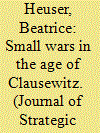

|
|
|
|
|
| Publication |
2010.
|
| Summary/Abstract |
Around the time of Clausewitz's writing, a new element was introduced into partisan warfare: ideology. Previously, under the ancien rgime, partisans were what today we would call special forces, light infantry or cavalry, almost always mercenaries, carrying out special operations, while the main action in war took place between regular armies. Clausewitz lectured his students on such 'small wars'. In the American War of Independence and the resistance against Napoleon and his allies, operations carried out by such partisans merged with counter-revolutionary, nationalist insurgencies, but these Clausewitz analysed in a distinct category, 'people's war'. Small wars, people's war, etc. should thus not be thought of as monopoly of either the political Right or the Left.
|
|
|
|
|
|
|
|
|
|
|
|
|
|
|
|
| 13 |
ID:
094061
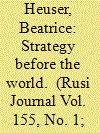

|
|
|
|
|
| Publication |
2010.
|
| Summary/Abstract |
Far from being purely a product of the twentieth century, the present understanding of 'strategy' has many reflections in antiquity and beyond. The history of the concept is a rich one, with wisdom carried through the ages rejecting the value of military victory simply for its own sake. Chief amongst these timeless lessons is that war must serve a political purpose and ultimately ensure a better, more just peace than existed antebellum.
|
|
|
|
|
|
|
|
|
|
|
|
|
|
|
|
| 14 |
ID:
104376


|
|
|
|
|
| Publication |
Santa Barbara, Praeger, 2010.
|
| Description |
x, 232p.
|
| Series |
Praeger security international
|
| Standard Number |
9780275998264, hbk
|
|
|
|
|
|
|
|
|
|
|
|
Copies: C:1/I:0,R:0,Q:0
Circulation
| Accession# | Call# | Current Location | Status | Policy | Location |
| 055968 | 355.0335/HEU 055968 | Main | On Shelf | General | |
|
|
|
|
| 15 |
ID:
128779
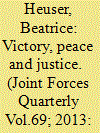

|
|
|
| 16 |
ID:
047312


|
|
|
|
|
| Publication |
London, Routledge, 2001.
|
| Description |
xv, 267p.
|
| Series |
New international relations series
|
| Standard Number |
0415244412
|
|
|
|
|
|
|
|
|
|
|
|
Copies: C:1/I:0,R:0,Q:0
Circulation
| Accession# | Call# | Current Location | Status | Policy | Location |
| 044872 | 327.16094/HAR 044872 | Main | On Shelf | General | |
|
|
|
|
|
|
|
|
|